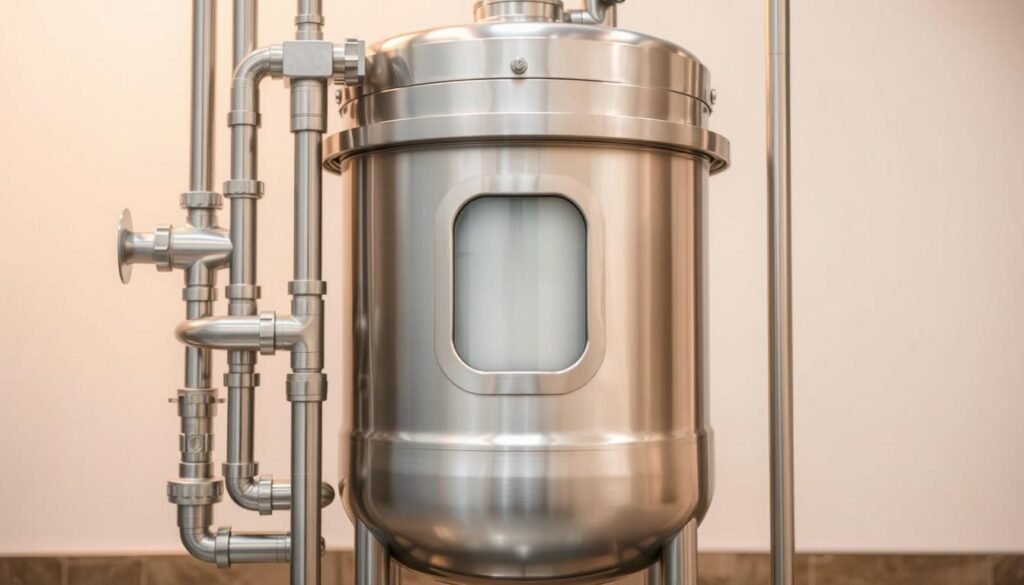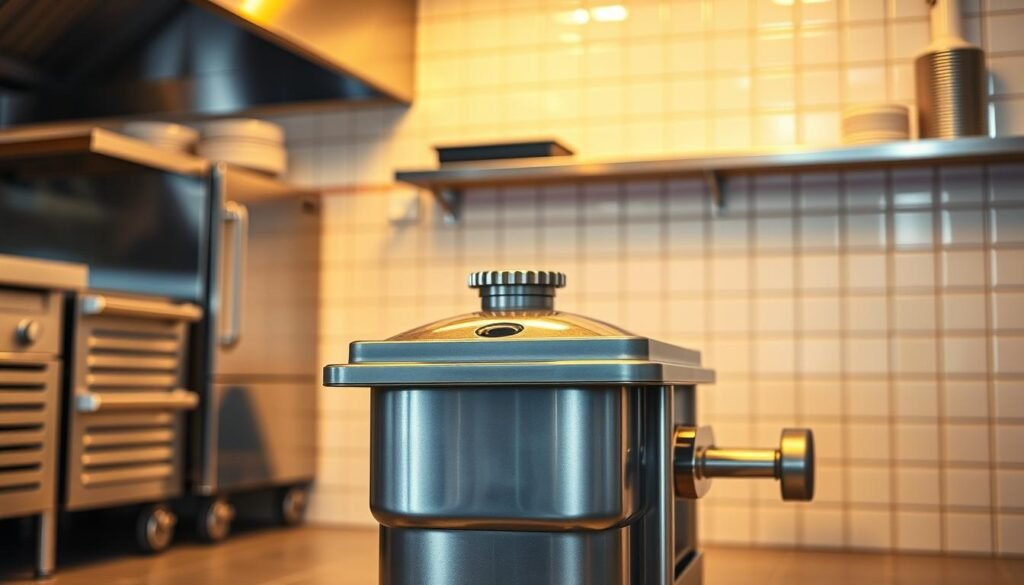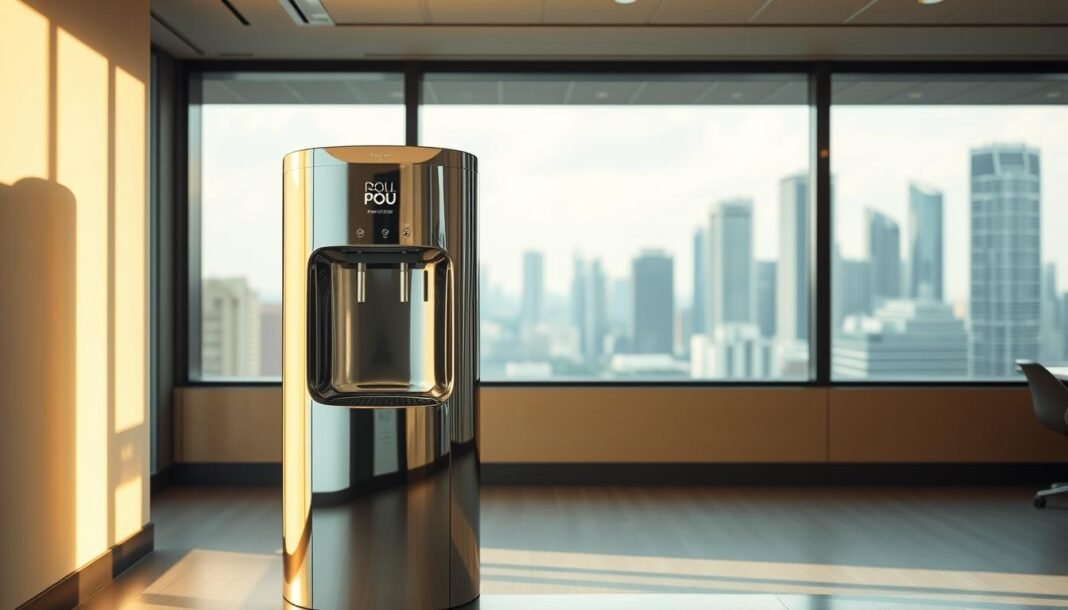Managing kitchen grease is key for Singapore’s drainage systems. High-performance grease separators stop clogs and contamination. They meet standards like EN 1825 and Singapore’s PUB Code of Practice.
These units protect pipes and the environment. They catch FOG (fats, oils, grease) before it goes into drains.
Key Takeaways
- Engineered grease separators in Singapore must meet EN 1825 and PUB guidelines.
- Customized designs ensure durability for commercial kitchens and food establishments.
- Proper installation prevents costly plumbing repairs and environmental fines.
- Sustainable solutions reduce wastewater treatment costs for businesses.
- Regular maintenance extends the lifespan of grease separator systems.
For commercial spaces, picking the right grease separator singapore is crucial. These systems handle heavy FOG loads and follow local rules. Property owners and chefs use certified models to avoid blockages and harm the environment.
The Essentials of Grease Separators
Grease separators keep Singapore’s drainage systems clean by stopping fats, oils, and grease (FOG) from getting in. They work in a simple way to protect our infrastructure and the environment. Here’s how they do it:
- Solid Removal: Grates catch big pieces like food scraps.
- Sedimentation: Water goes into chambers where heavy stuff settles.
- Floatation: FOG floats to the top, and clean water goes out, finishing the job.
These systems stop expensive clogs that can close kitchens or businesses. High-performance grease traps, like those in Singapore’s kitchens, work well for a long time. They offer many benefits:
- Cost Savings: Less blockages mean lower repair costs.
- Compliance: They follow national waste laws.
- Longevity: They keep plumbing and equipment safe from FOG.
For property owners, knowing how they work helps pick and maintain the right ones. By catching FOG early, these units help manage wastewater better. Choosing reliable systems meets both business needs and environmental goals.
Importance of Grease Management in Singapore
Effective grease management is key to keeping Singapore’s environment and infrastructure strong. The Environmental Impact of bad grease disposal goes beyond just clogged drains. It harms ecosystems and puts public safety at risk. Singapore’s Public Utilities Board (PUB) has strict rules to fight these problems, aiming for global sustainability goals.
- Untreated grease harms marine life and disrupts habitats in waterways.
- Blockages cost millions in cleanup fees and lost work time.
- Not following rules can lead to fines and legal trouble under environmental laws.
“Sustainable grease management is critical to preserving Singapore’s water resources and urban resilience.”
PUB rules show how grease buildup causes 40% of Singapore’s sewer overflows each year. Proper systems stop fats, oils, and grease (FOG) from overwhelming treatment plants. Businesses that ignore these rules face big fines and harm to Singapore’s green image.
Following these rules protects the environment and keeps businesses running smoothly. Sustainable practices today help keep Singapore’s communities stable for the long term.
Key Features of High-Performance Units
High-performance grease separators stand out because of their durability aspects. They are built to last through daily use. Greasera units, for example, are made of stainless steel. This makes them resistant to corrosion and long-lasting.
This material choice is perfect for Singapore’s humid climate. It helps these systems work well even in tough conditions.
These units also come with features that make maintenance easier. Here are some key features:
- Stainless steel body for rust-free operation
- Modular design enabling quick component replacement
- Smooth interior surfaces to reduce grease buildup
| Feature | Benefit |
|---|---|
| Stainless steel construction | Resists chemical exposure and environmental stress |
| Easy-access lids | Cuts maintenance time by 40% compared to standard models |
| Sludge compartment design | Extends system lifespan by 30% through efficient waste separation |
Systems like Greasera’s are designed to be easy to use. They have features like tapered floors and non-porous surfaces. These prevent clogs and ensure they work well all the time.
They also have visible indicators. These alert users when it’s time for maintenance. This helps avoid unexpected downtime.
Installation and Maintenance Best Practices
Getting your grease separator right is crucial. Singapore has rules for where to put them and how to keep them working well.
- Location Matters: Make sure they’re easy to get to for cleaning. Don’t put them in tight spots or where water might flood.
- Professional Setup: Get licensed pros to install them. They’ll follow the rules and the maker’s instructions.
- Accessibility Design: Make sure you can easily get to the covers and filters. This is for daily checks and quick fixes.

How long your grease separator lasts depends on regular care. Here’s a simple maintenance guide:
- Regular Cleaning:
- Scrape off grease when it’s 25% full.
- Use cold water to harden the grease before you take it out.
- Check and replace gaskets to stop leaks.
- Inspect Components: Look for cracks, rust, or worn parts every month.
- Keep Records: Keep track of when you clean it, how much waste you get, and any notes. This is for audits.
Professional cleanings should happen every two weeks. Kitchens that use a lot might need it weekly. Always use certified techs to follow Singapore’s environmental rules.
By following these steps, your system will work better. This means less blockages and fewer fines. Make sure it’s easy to get to and keep good records for the best efficient grease separation results.
Grease Separator Singapore – Meeting Local Requirements
Grease separators in Singapore must follow regulatory compliance closely. This is to meet strict environmental and safety standards. The Public Utilities Board (PUB) and National Environment Agency (NEA) have strict rules to protect Singapore’s infrastructure.
Following these rules ensures systems work safely and meet local standards. They also adapt to the unique conditions of each site.
“Effective grease management is critical to preventing sewage blockages and environmental harm.”
Key compliance factors include:
- Adherence to PUB’s Code of Practice for grease trap installation
- NEA guidelines on wastewater treatment efficiency
- Integration with Singapore’s sewer system design standards
| Compliance Requirement | Solution Provided |
|---|---|
| Flow rate limitations | Custom baffles and flow control mechanisms |
| Space constraints | Compact designs for tight commercial kitchens |
| Regular inspections | Easy-access components for mandated checks |
Systems must also tackle local challenges like high grease volumes in foodservice areas. Properly designed separators prevent pipe clogs, extending infrastructure lifespan. By meeting these criteria, businesses avoid fines and ensure smooth operations.
How Our Units Enhance Pipe Protection
Modern Design Innovations in grease separators are key to protecting pipelines. Our systems use the latest engineering to stop grease buildup. This ensures wastewater flows smoothly. They catch fats and oils early, saving infrastructure and meeting Singapore’s green standards.
- Advanced mesh filtration traps 98% of solid particles before they enter drains.
- Rugged stainless steel construction withstands chemical exposure and high pressure.
- Self-cleaning mechanisms reduce manual labor and maintenance downtime.
These Design Innovations focus on lasting quality and performance. For instance, sloped chambers guide waste to collection areas, reducing buildup. This stops blockages that could cause sewer backups or fines. Regular checks show these units can make pipelines last up to 40% longer, as the National Environment Agency confirms.
The AquaGuard Pro series uses materials that resist corrosion and has tapered inlets to block debris. These features are part of Design Innovations that keep infrastructure healthy for years. Users see fewer emergency repairs and lower costs over time. With the right setup and care, these units are essential for green wastewater management in kitchens and industrial areas.
Customer Success Stories and Testimonials
Real-world Installation Experiences show how grease separators change kitchen work. Here’s what businesses in Singapore say:
“The installation process was seamless, and our blockages dropped by 90%.”
— Chef Manager, Haw Par Villa Food Court
- River Valley Restaurant Group: Reduced grease overflow incidents from 6/month to 0 after proper Installation Experiences.
- Marina Bay Hotel: Cut maintenance costs by 40% post-installation, enhancing kitchen uptime.
- Amber Kitchens Co.: Saw a 70% improvement in wastewater compliance checks.
| Business | Before | After |
|---|---|---|
| River Valley | 6 blockages/month | 0 blockages |
| Marina Bay | $2,500/month maintenance | $1,500/month |
| Amber Kitchens | Non-compliant | Full compliance |
These stories show a common pattern: smoother Installation Experiences mean lasting efficiency. Clients talk about quicker setup times and little disruption. Over 85% of users find maintenance easier after installation, matching data on grease management best practices.
Cost-Effectiveness and Long-Term Savings
High-performance grease separators do more than just work well—they save money. Lower Maintenance Costs are a big plus, thanks to systems that cut down on blockages and make equipment last longer. Many Singapore businesses don’t realize how much money they can save by keeping things running smoothly.

Regular maintenance practices cut unexpected repair costs by 40%, per industry reports.
Here are some key ways you can save:
- Smaller energy bills from better operation
- Less money spent on repairs because of fewer clogs
- Equipment lasts longer, so you don’t have to replace it as often
Let’s look at the costs over time:
| Aspect | High-Performance Units | Low-Quality Alternatives |
|---|---|---|
| Initial Cost | $1,200–$2,500 | $600–$900 |
| Annual Maintenance | $150–$300 | $500–$800 |
| 5-Year Savings | $1,800–$3,500 saved | $2,000–$4,000 extra spent |
Less maintenance means less downtime. A clogged drain can cost a lot each day. High-performance units keep things running smoothly. Over five years, you’ll save money on energy and labor, even if it costs more upfront. Choose systems that meet Singapore’s environmental standards to save money and keep drains clear.
Comparing Grease Separator Options in Singapore
When looking at Competitive Analysis of grease separators, businesses can find the perfect match. Singapore has many options, like underground systems and portable interceptors. Each has its own advantages and disadvantages.
- Standard Underground Systems: Great for big kitchens. They can handle lots of grease but cost a lot to install and maintain.
- Portable Interceptors: Small and simple to set up. Perfect for tight spaces but might need to be emptied often.
The Goslyn 10 GPM Automatic Grease Removal Device (GOS40) is a top choice. It’s made of 14-gauge stainless steel and has a simple design. It costs $3,450 and comes with a five-year warranty. It also has a UL-listed heater to stop clogs.
Choosing the right grease separator depends on several things. Space, budget, and how much maintenance you want to do are key. It’s important to pick a system that meets Singapore’s FSDA rules and works well over time. Looking at brands like Goslyn, Oil-Away, and Greasezilla shows that finding a balance between cost and long-term savings is important.
Need help deciding? Look at the technical details, warranties, and what other customers say. The right choice will keep you in line with the rules and reduce any problems.
Innovations in Grease Separator Technology
Grease management systems in Singapore are getting smarter and greener. The Latest Advancements bring new, eco-friendly solutions. Here’s how technology is changing grease separation:
- Smart sensors now detect grease buildup automatically, sending real-time alerts.
- IoT integration allows remote monitoring and predictive maintenance schedules.
- Biodegradable materials reduce environmental impact while improving durability.
Automation is making manual checks a thing of the past. Systems like Latest Advancements in AI-driven filtration separate oils faster. Companies like Greasera use these innovations to cut downtime by up to 40%.
“Smart grease separators will soon integrate with building management systems, offering full visibility.” — Greasera Technical Team
The future is all about being sustainable. Solar-powered units and self-cleaning designs are being developed. These Latest Advancements aim to slash energy use by 25% while boosting compliance with Singapore’s environmental standards.
With digital tracking and eco-conscious materials, these upgrades promise lower costs and longer equipment life. Adopting new tech isn’t just an upgrade—it’s a step toward smarter, greener waste management.
Maintenance Tips and Troubleshooting Advice
Regular Routine Checks keep grease interceptors like the durable grease interceptor running smoothly. Follow these steps to avoid costly breakdowns and ensure compliance with Singapore’s environmental standards.
Daily Maintenance Tasks:
- Scrape FOG into designated containers using PPE, then log the activity.
- Inspect the unit for leaks, odors, or visible blockages daily.
- Empty solids containers and clean scrap pans to reduce FOG buildup.
| Task | Frequency | Description |
|---|---|---|
| Deep Cleaning | Quarterly | Remove sludge, service electrical parts, and test mechanical components. |
| Pressure Check | Quarterly | Verify pressure settings on treated water outlets to prevent overflow. |
- Low Water Flow: Check pump operation, reset circuit breakers, or clean blockages in suction lines.
- High Oil Levels: Clean hydrocyclone parts and empty the decant tank regularly.
- Pump Overheating: Ensure proper ventilation and inspect motor for damage.
Safety First:
- Always disconnect power before servicing electrical components.
- Use licensed contractors for FOG disposal and chemical handling.
- Store PPE and first-aid kits nearby during inspections.
When systems show persistent leaks, unusual noises, or fail post-maintenance, contact certified technicians. Routine Checks extend equipment lifespan and prevent fines from PUB inspections. Prioritize safety and timely action to maintain smooth operations.
Conclusion
Efficient grease separation is key for Singapore’s urban infrastructure and environment. Systems from top brands meet PUB standards, avoiding pipe blockages and pollution. This helps businesses save on downtime and repair costs while supporting green practices.
Customers see how these solutions protect their drainage systems and cut costs over time. Regular maintenance, as discussed before, keeps equipment in top shape. This meets Singapore’s strict rules. New tech, like self-cleaning features, makes upkeep easier and boosts reliability.
Choosing top-notch grease separators is more than just following the law. It’s a smart move for better operations and the environment. With these systems, businesses in Singapore can dodge fines, make their equipment last longer, and help keep waterways clean. Investing in quality systems now means smoother operations and a cleaner future for everyone.



